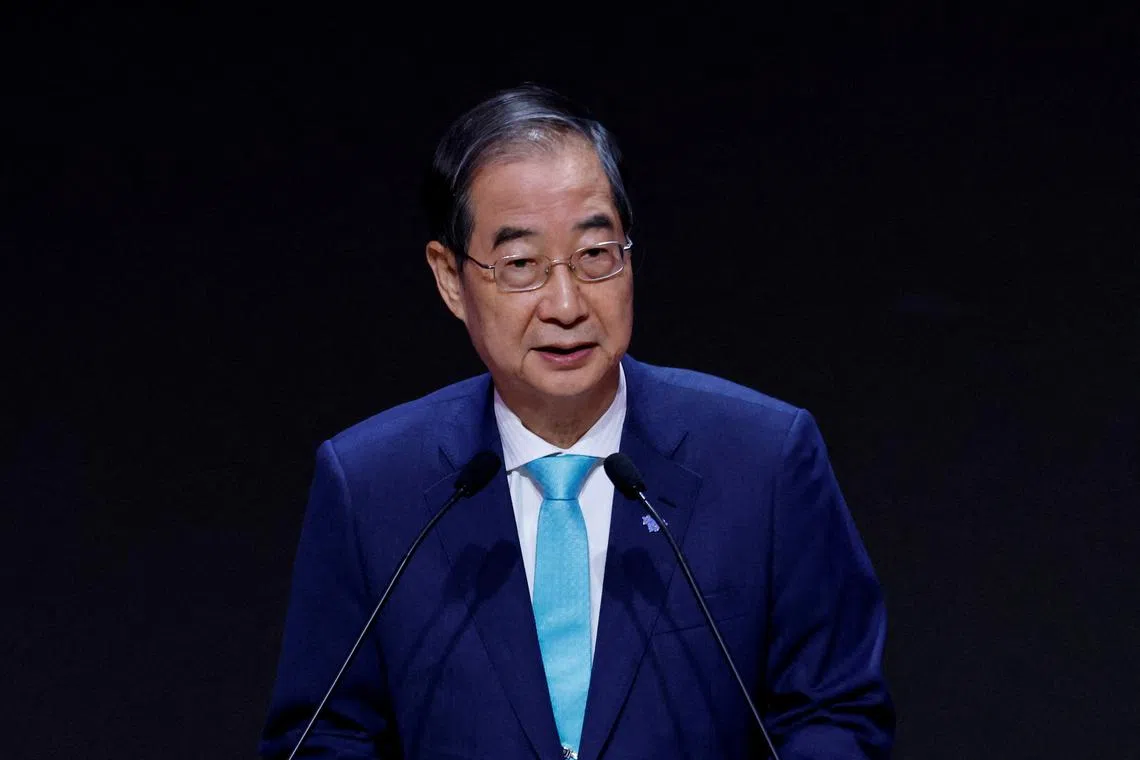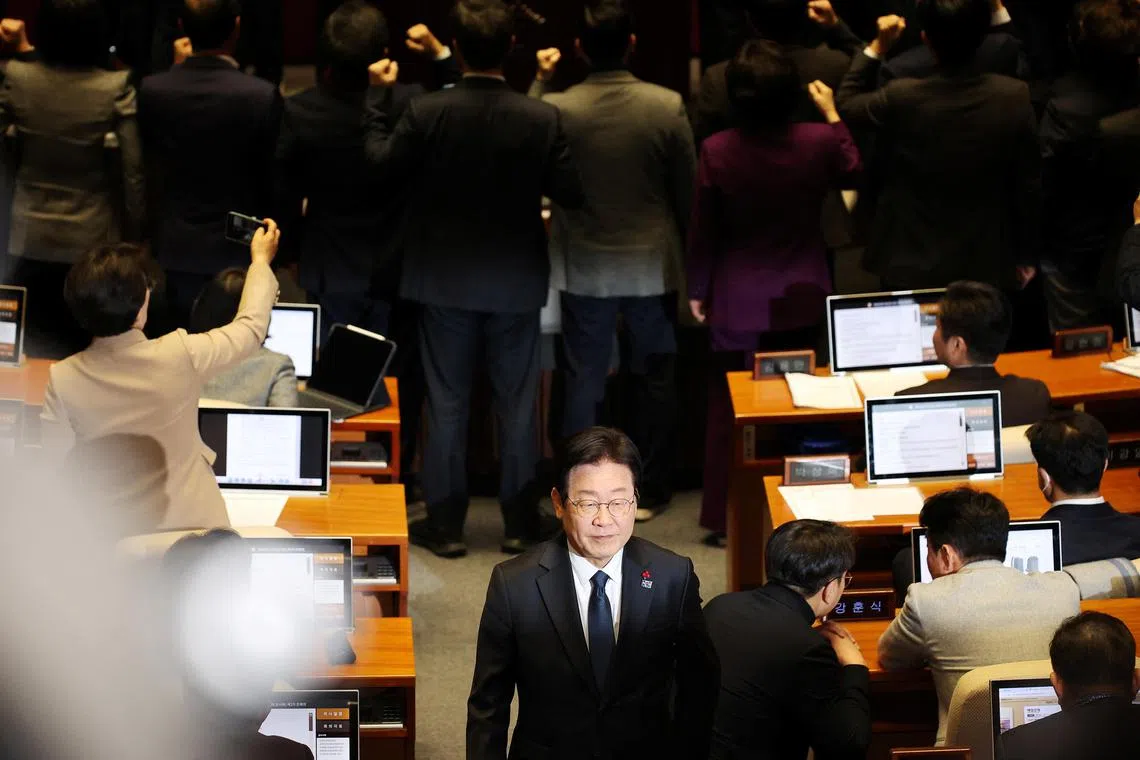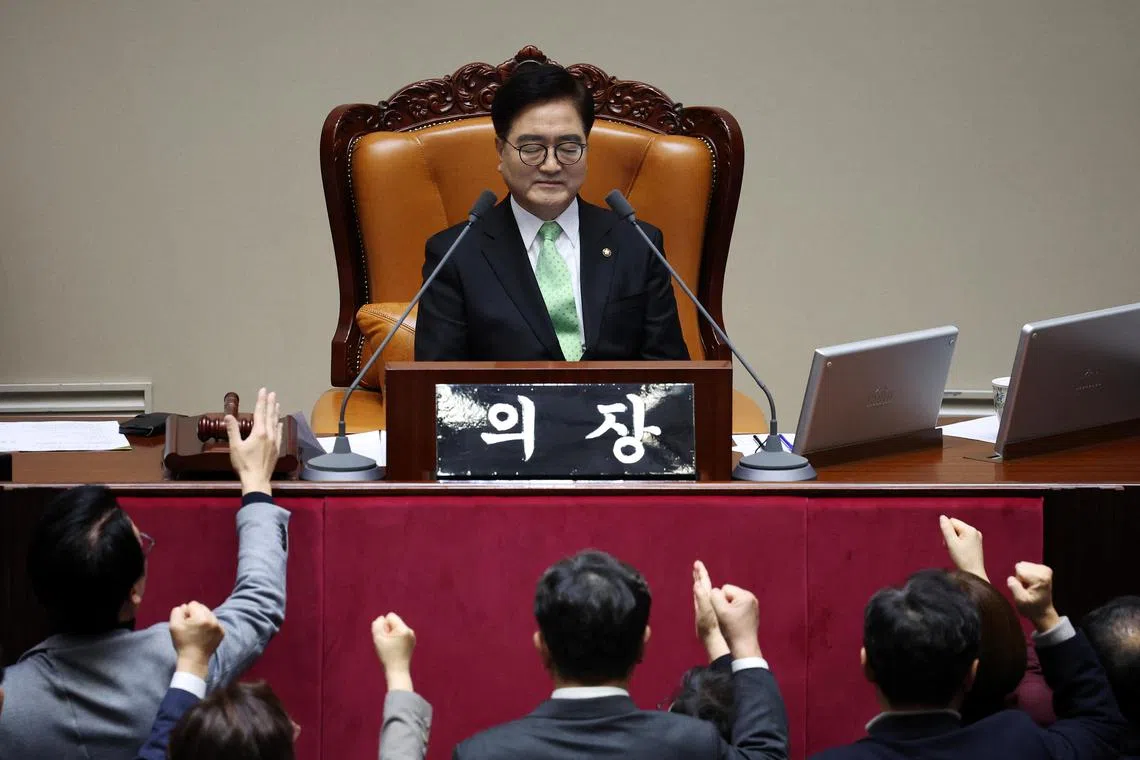S. Korea Parliament majority votes to impeach Acting President Han Duck-soo
Sign up now: Get insights on Asia's fast-moving developments

Mr Han Duck-soo has been serving as acting president since Dec 14 following President Yoon Suk Yeol’s suspension.
PHOTO: REUTERS
SEOUL - South Korea’s parliament impeached Acting President Han Duck-soo on Dec 27, less than two weeks after suspending President Yoon Suk Yeol’s powers over his short-lived declaration of martial law, plunging the country deeper into political chaos.
The impeachment of Mr Han, who has been acting president since Mr Yoon was impeached on Dec 14
Finance Minister Choi Sang-mok, who assumed the position of acting president while the cases of Mr Yoon and Mr Han are considered by the Constitutional Court, convened the National Security Council, spoke with key officials including military leaders and vowed to do everything in his power to stabilise state affairs.
The unexpected imposition of martial law and the ensuing political upheaval sent shockwaves through Asia’s fourth-largest economy, and drew concerns from allies in the United States and Europe who had seen Mr Yoon as a key partner in efforts to counter China, Russia and North Korea.
Mr Han’s sudden ouster adds to the uncertainty, and Mr Choi may also face removal if he too clashes with the opposition-led parliament.
“The government must do its best to ensure that the people do not become anxious, or the security of the country and people’s daily lives are not shaken,” Mr Choi said, according to a statement from his office.
Earlier, Mr Choi had pleaded unsuccessfully with parliament to withdraw the plan to impeach Mr Han, saying it would do serious damage to the economy.
The Korean won was down 0.5 per cent at 1,477.0 per dollar as of 11am GMT, after hitting a more than 15-year low of 1,486.7 ahead of the vote.
“In terms of financial markets, (Mr Choi) taking charge can only be bad news, as it only goes to show that political turmoil is ongoing,” said Mr Huh Jae-hwan, an analyst at Eugene Investment & Securities.
The country could plunge into economic troubles comparable to its devastating financial crisis of the late 1990s, said Mr Shin Yul, a political science professor at Myongji University.
Constitutional fight
The impeachment of Mr Han came after he declined to immediately appoint three justices to fill vacancies at the Constitutional Court, saying it would exceed his acting role.
Mr Han said he accepted the outcome. “...In order to avoid further chaos and uncertainty, I will suspend my duties in accordance with relevant laws,” he said.
He added he would await the decision of the Constitutional Court to review the impeachment motion.
The motion led by opposition parties passed with 192 of the 300 votes amid rowdy scenes by ruling People Power Party members who surrounded the Speaker’s podium chanting the vote was invalid and Parliament had committed “tyranny”.
Ahead of the parliamentary session, opposition leader Lee Jae-myung said his Democratic Party (DP), which has majority control of Parliament, will go ahead with the plan to impeach Mr Han, accusing him of “acting for insurrection”.

South Korean opposition leader Lee Jae-myung during the impeachment vote at the National Assembly in Seoul on Dec 27.
PHOTO: REUTERS
“The only way to normalise the country is to swiftly root out all the insurrection forces,” Mr Lee said in a fiery speech.
The plan for a vote to impeach Mr Han
Until just before voting began, it was unclear how many votes were needed
Speaker Woo declared a simple majority would constitute parliamentary approval.

South Korea’s ruling People Power Party lawmakers protesting against Speaker Woo Won-shik during the impeachment vote at the National Assembly in Seoul on Dec 27.
PHOTO: REUTERS
Swift trial
Also on Dec 27, the Constitutional Court held its first hearing to review whether to reinstate Mr Yoon or remove him permanently from office. It has 180 days to reach a decision.
At a preparatory hearing, Justice Cheong Hyung-sik denied a request by Mr Yoon’s lawyers for a postponement in proceedings to better prepare and said the court would move swiftly.
The next hearing is due on Jan 3.
A lawyer representing Mr Yoon later told reporters the impeached president planned to appear in person in future.
He was not required to attend the Dec 27 hearing. He has previously ignored court requests to submit documents as well as summons in a separate criminal case over his martial law declaration.
If he is ousted, a new presidential election would be held within 60 days.
There has been overwhelming public support for Mr Yoon’s removal, opinion polls showed after his martial law attempt.
Worst political crisis in decades
Mr Yoon shocked the country and the world with a late-night announcement on Dec 3 that he was imposing martial law to overcome political deadlock and root out “anti-state forces”.
Within hours, however, 190 lawmakers had defied the cordons of troops and police and voted against Mr Yoon’s order. About six hours after his initial decree, Mr Yoon rescinded it.
Events since the declaration have sparked South Korea’s gravest political crisis since 1987, when protests forced the ruling party of former military generals to accept a direct, popular vote to elect the president.
On Dec 27, prosecutors indicted former Defence Minister Kim Yong-hyun in the first move to put on trial an official accused of insurrection, Yonhap news said. REUTERS


